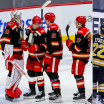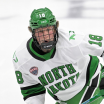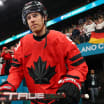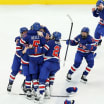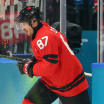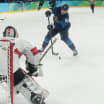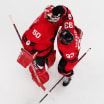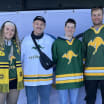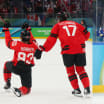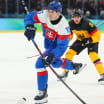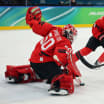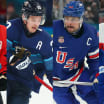Over the decades, some of the best hockey players became some of the worst worriers when it came to their superstitions.
Seeking good luck charms was a major part of Hall of Famer
Phil Esposito
's personality, especially when he led the Boston Bruins to Stanley Cup titles in 1970 and 1972. Like other superstitious players, Esposito often relied on a teammate to help him through his ritual.
NHL superstars no strangers to superstitions
Esposito, Hall, Gretzky, Crosby legendary for fiercely following pregame rituals
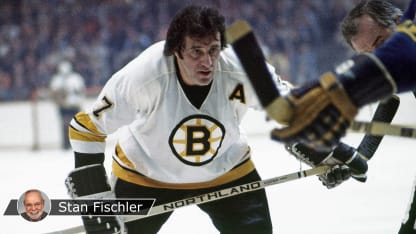
By
Stan Fischler
Special to NHL.com
In one case, it was the Bruins ace defensive center Derek Sanderson, a chain smoker who believed cigarettes and Lady Luck were synonymous with winning.
"With Phil," said Sanderson, "from the very beginning I had to put up with his superstitions. I would fix his shoulder pads just right; put on his suspenders and all that. I'd be on the floor doing my skates and [he] would say, 'All right, do my shoulder pads.' And I'd have no choice.
"I'd just have to do it and then go back to my skates. I'd say 'Espie, what's the matter with you?' Right away he'd answer in his inimitable way: 'I got a superstition, kid, a SUPER-STISH.'"
One of those superstitions involved wearing something black under his Bruins jersey; a dickey with a high neck.
"It just slipped over my head," said Phil, "and down over my chest. I wore it one night against Toronto because I had a cold. Got three goals that night so I wore it ever since. I'd dress right to left; put my right sock on first, then left. Then everything else, right first, then left. And we'd go out on the ice the same way all the time."
Montreal Canadiens forward John Ferguson was one of Esposito's longtime foes during the late 1960s and early 1970s. Like Esposito, Ferguson had his share of good luck ploys and plans.
One Sunday morning, when the Canadiens and New York Rangers were engaged in a Stanley Cup playoff series, Ferguson was strolling along West 49th Street in Manhattan when he came upon Montreal Star columnist Pat Curran, who was en route to the Actors' Chapel of St. Malachy's Church near the old Madison Square Garden.
When Curran told Ferguson where he was going, Ferguson put his hand in his pocket and pulled out a quarter. "Here," he said, "light a candle for me."
That same night, Ferguson scored in overtime to win the series for Montreal.
As any coach, player or manager will admit, prayers don't always work. Emile "The Cat" Francis once played goal for the Chicago Blackhawks and made a number of friends in the Windy City. One of them was a Monsignor.
When the Francis-coached Rangers reached the seventh game of a playoff against the Blackhawks years later, the Monsignor came along to say Sunday Mass in Francis' suite at Chicago's Hotel Bismarck.
It didn't work; the Rangers played their worst game of the series and the Blackhawks moved on to the Final.
On the other hand, Francis remembered the power of prayer working for him when he was coaching in Guelph, Ontario, and his junior team was playing the powerful Toronto St. Michael's team.
"We haven't got a chance," muttered one of Francis' players. "I just saw that whole St. Mike's team coming out of church."
"I've got news for you," Francis said. "I was in that same church and praying just as hard as they were."
Francis' team won.
Hall of Fame goaltender
Glenn "Mr. Goalie" Hall
was known throughout his career for having one of the strangest rituals. Before each game, to assuage his nerves, he would make himself vomit. With 407 wins and two Cup championships, there may have been some validity in the exercise.
Chuck "Bonnie Prince Charlie" Rayner and "Sugar" Jim Henry had once been goalie teammates on the Rangers. Eventually Henry was traded to the Bruins and was set to face Rayner in an upcoming game at Madison Square Garden.
As many players had done before, Rayner visited St. Malachy's Church near the Garden and sat in a front pew. However, when he looked up, there was Henry praying at the other end.
Not surprisingly, the game ended in a tie.
Not even "The Great One" could escape superstitions. Hall of Fame center
Wayne Gretzky
was a creature of habit and had a superstition that involved drinking the same beverages in the same order between periods; swigging a Diet Coke, ice water, Gatorade and a second Diet Coke before going back onto the ice.
Today's players are just as ferociously habitual as their predecessors. Pittsburgh Penguins center Sidney Crosby does the same thing before every game. He'll take the circuitous route, sans teammates, that will avoid the visitors locker room.
Crosby will set up in his stall at the same time every day. His sticks are taped the same way next to the ice before pregame warmups, and he'll eat a peanut butter and jelly sandwich at 5 p.m. sharp.
Getting loose happens in the same pattern; with a soccer kick-around followed by stretches in the same order. He caps off the preparations with a special handshake he shares with center Evgeni Malkin -- the only player who goes off the ice after him.
Punch Imlach, who led the Toronto Maple Leafs to four Stanley Cup titles, was among the most superstitious hockey people ever. This was most evident during the 1966-67 playoffs, when his club was an underdog against the defending champion Canadiens.
Among Imlach's favorite things was using apparel as part of his superstitions. In Montreal, his favorite stop was a store called Tony The Tailor. On this day, Imlach believed a green-checked jacket would bring his Maple Leafs luck.
"I want to wear it on the night we win the Stanley Cup," Punch told Tony, who happened to be a Canadiens fan.
Tony looked quizzically at Imlach and shot back: "If you want to wear the suit when you win the Stanley Cup, I think you're going to wait a while -- like years -- to wear it."
Imlach only had to wait a week or so; Toronto won the Cup, defeating the Montreal in six games.
During yet another playoff series, Imlach bought a new suit for each game, which prompted a Toronto newsman to ask a simple question:
"Will it help?"
"Sure," Imlach shot back, "if my goalie is good and we score a lot of goals!"
